The Northern Weekly Salvo
Incorporating Slaithwaite Review of Books, Weekly Notices, Sectional Appendices, Tunnel Gazers’ Gazette and Northern Umbrella,etc. Descendant of Teddy Ashton’s Northern Weekly and Th’Bowtun Loominary
Published at 109 Harpers Lane, Bolton, Lancashire BL1 6HU email: paul.salveson@myphone.coop
Publications website: www.lancashireloominary.co.uk
No. 296 September 22nd 2021
Salveson’s half-nakedly political digest of railwayness, tripe and secessionist nonsense from Up North. Sometimes weekly, usually not; definitely Northern. Read by the highest and lowest officers of state, Whitmanites, weirdos, misfits, steam punks, trespassers, yes women, no men, gay Swedenborgians, cat-spotters, discerning sybarites, ILPers, bi-guys, non-aligned social democrats, mis-aligned pie-eaters, tripe dressers, nail artists, self-managing VIMTO drinkers, truculent Northerners, grumpy Norwegians, absurd Marxists, sleepy Hungarians, members of the clergy and the toiling masses, generally. All views expressed are my own and usually nobody else’s. Official journal of the Station Cat Improvement Network, Pacer Dining Club, Station Buffet Acceleration Council and the Campaign for a North with a capital ‘N’.
“We are far more united and have far more in common with each other than things that divide us.” – Jo Cox, maiden speech in House of Commons, June 3rd 2015.
General gossips
A bit of catching up to do after a busy few weeks.
The highlight was undoubtedly the celebration of the 125th anniversary of the Winter Hill ‘Mass Trespass’ of 1896, though it has to be said that the thousands of people who took part didn’t see themselves as ‘trespassers’ at all – they were reclaiming a public right which the landowner had taken away. I enjoyed a trip up to Nelson to admire the superbly refurbished Unity Hall, built in 1907 by the Independent
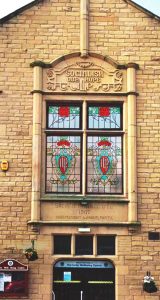
Labour Party, with its ILP 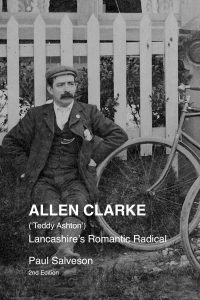 features lovingly preserved. Seems a while ago now, but a journey down to Bournemouth for the REPTA conference gave an opportunity to test out the local bus network and visit Thomas Hardy’s birthplace. More below. I’m busy promoting my new book – an updated edition of my biography of Allen Clarke (Allen Clarke/‘Teddy Ashton’ – Lancashire’s Romantic Radical). If you have a shop that could sell it (and it doesn’t have to be a bookshop!) please let me know. More on the book below, including Salvo readers’ special offer.
features lovingly preserved. Seems a while ago now, but a journey down to Bournemouth for the REPTA conference gave an opportunity to test out the local bus network and visit Thomas Hardy’s birthplace. More below. I’m busy promoting my new book – an updated edition of my biography of Allen Clarke (Allen Clarke/‘Teddy Ashton’ – Lancashire’s Romantic Radical). If you have a shop that could sell it (and it doesn’t have to be a bookshop!) please let me know. More on the book below, including Salvo readers’ special offer.
Lib Dems go for regional assemblies
The Lib Dems held their annual conference at the weekend and approved a motion committing them to campaigning for elected regional assemblies. That’s a very good development though perhaps we need to move on from the very 1970s idea of regions based on the standard planning regional boundaries, which created a very large ‘North-West’ region which few people identify with. In contrast, ‘Yorkshire’ (whether just ‘Yorkshire’ or with ‘the Humber’ added) does make a lot of sense, as does the North-East. My own preference is for ‘county regions’ based on strong regional identities. In the North-West

this means a re-formed ‘Lancashire’ covering much of what was taken out in 1974 (but arguably leaving ‘north of the sands’ in Cumbria). Should Merseyside form a separate region? Cheshire? It’s all very complicated and there needs to be a lot of consultation on the most appropriate and popular regional forms. The other option is to go for a huge ‘Northern’ region which includes everyone.  It has its attractions but it is too big as a region. A number of smaller regions which match with people’s historic (and current) identities but working together as ‘the North’ is a better approach, in my view. Others may differ. One of the strengths of the Hannah Mitchell Foundation is that it is keeping an open mind on options for democratically-elected regional government for the North. Will Labour make common cause with the Lib Dems for ‘proper’ devolution?
It has its attractions but it is too big as a region. A number of smaller regions which match with people’s historic (and current) identities but working together as ‘the North’ is a better approach, in my view. Others may differ. One of the strengths of the Hannah Mitchell Foundation is that it is keeping an open mind on options for democratically-elected regional government for the North. Will Labour make common cause with the Lib Dems for ‘proper’ devolution?
Trespassers Welcome! Winter Hill commemorated
On Sunday September 6th 1896 some 10,000 people marched over Winter Hill, just north of Bolton, to reclaim a road which had been used by local people for generations. The first commemoration was in 1982, followed by a gap before the centenary in 1996. After 25 years a few hardy souls decided that another commemoration would be a good 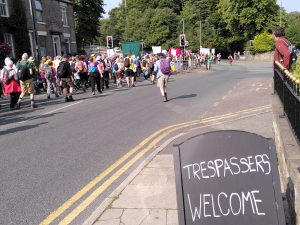 idea, before we all get too old. On Sunday September 5th this year, around a thousand people, perhaps a few hundred more, walked the original route, accompanied up Halliwell Road by the PCS Union Samba Band. It was a great day, with warm sunshine and even warmer comradeship which crossed political divisions – the local (Tory) MP Chris Green was spotted on the march.
idea, before we all get too old. On Sunday September 5th this year, around a thousand people, perhaps a few hundred more, walked the original route, accompanied up Halliwell Road by the PCS Union Samba Band. It was a great day, with warm sunshine and even warmer comradeship which crossed political divisions – the local (Tory) MP Chris Green was spotted on the march. 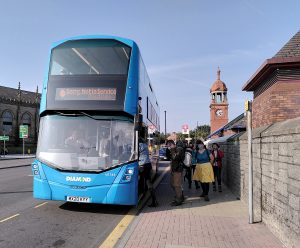 A big thanks to Diamond Buses NW for their help in getting people to and from the walk (see right – collecting walkers at the station in the morning), the support of The Woodland Trust, Bolton Mountain Rescue and the PCS and Unison unions. Just like 125 years ago, people turned out along Halliwell Road to cheer the marchers on, and the Ainsworth Arms displayed a ‘Trespassers Welcome’ outside the door! Very appropriate 🙂
A big thanks to Diamond Buses NW for their help in getting people to and from the walk (see right – collecting walkers at the station in the morning), the support of The Woodland Trust, Bolton Mountain Rescue and the PCS and Unison unions. Just like 125 years ago, people turned out along Halliwell Road to cheer the marchers on, and the Ainsworth Arms displayed a ‘Trespassers Welcome’ outside the door! Very appropriate 🙂
The ‘discovery’ of the events of 1896 owes much to Allen Clarke, who wrote of the battles in his Moorlands and Memories published in 1920. At the time of the demonstrations Clarke was living in Bolton and editing his Teddy Ashton’s Journal. After the first demonstration (there were several more) 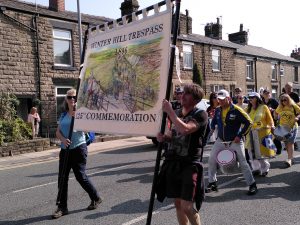 he published one of his dialect sketches publicising the struggle. ‘Bill Spriggs an’ Patsy Filligan o’er Winter Hill; Likewise Bet’ appeared on September 9th, and helped swell the ranks of the following Sunday’s march to an amazing 12,000. The sketch included this song:
he published one of his dialect sketches publicising the struggle. ‘Bill Spriggs an’ Patsy Filligan o’er Winter Hill; Likewise Bet’ appeared on September 9th, and helped swell the ranks of the following Sunday’s march to an amazing 12,000. The sketch included this song:
Will yo’ come o’ Sunday mornin’
For a walk o’er Winter Hill?
Ten thousand went last Sunday
But there’s room for thousand still!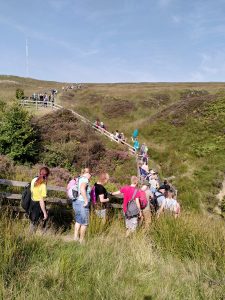
Oh there moors are rare and bonny
And the heather’s sweet and fine
And the road across the hilltops –
Is the public’s – yours and mine!
Chorus:
So come o’ Sunday mornin’
For a walk o’er Winter Hill?
Ten thousand went last Sunday
But there’s room for thousand still!
Oh shame upon the landlord
That would thrutch us up in town!
Against such Christless conduct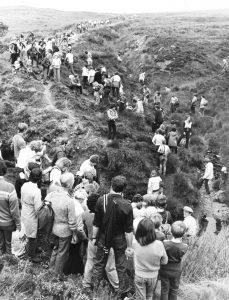
We will put our feet firm down!
Ay we’ll put our feet down strongly
Until we’ve clearly showed
Twenty thousand feet each Sunday
Can soon mark out a road!
Must poor folk stroll in cinders
While the rich cop all the green?
Is England but the landlord’s?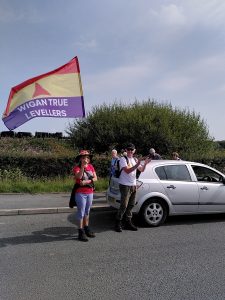
Who locks up each pretty scene?
If they only could these tyrants
Would enclose the road to heaven!
So let us up and fight ‘em
Even seventy times and seven!
The full story of the 1896 events was told in my pamphlet Will Yo’ Come O’Sunday Mornin’? 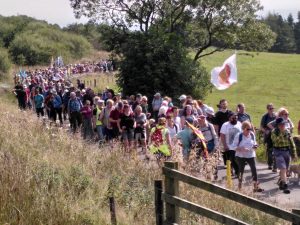 The 1896 Battle for Winter Hill, published in 1982 and updated in 1996 but now out of print. There’s quite a bit on the events in Moorlands, Memories and Reflections, which is still available. A film of the recent walk, made by Nigel Coates, will be shown later this Autumn at The Ainsworth Arms. Trespassers very welcome.
The 1896 Battle for Winter Hill, published in 1982 and updated in 1996 but now out of print. There’s quite a bit on the events in Moorlands, Memories and Reflections, which is still available. A film of the recent walk, made by Nigel Coates, will be shown later this Autumn at The Ainsworth Arms. Trespassers very welcome.
Selina Cooper celebrated
North-east Lancashire has a rich socialist history; and nowhere is this exemplified more than in Nelson. The ILP Clarion House is a couple of miles away from this once thriving cotton weaving town and in
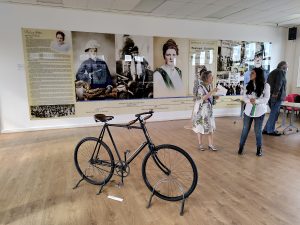
Nelson itself the magnificent Weavers; Institute remains. A short distance out of the town centre (under the railway and up the hill) is Unity Hall. Its history dates back to 1907 when the local ILP built ‘The Socialist Institute’. It has had a chequered history in recent years, recounted in an excellent booklet just published to coincide with the re-opening of the hall after an extensive refubishment, funded by Heritage Lottery Fund with support from Nelson Town Council.
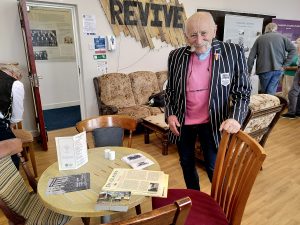
The links with the town’s socialist tradition have been retained and strengthened, with pride of place going to Selina Cooper, a weaver from Brierfield who played a leading role in the movement for women’s suffrage, active in the ILP, co-operative movement and the Women’s Peace Crusade. There are displays in ‘Unity Hall’ on the Clarion Cycling Club and space for meetings, film shows and a cafe. Congratulations to all involved in this wonderful project.
Bolton Film Festival at the Platform 5 Gallery
The internationally-recognised Bolton Film Festival has a two day programme of short films at the P5 Gallery, Platform 5, Bolton Station on the 29th and 30th September . The festival is a BIFA and BAFTA -qualifying short film festival, an impressive feat achieved in just five years since the festival started, very much thanks to Adrian Barber and Zőe Rothwell.
In her introduction to the Bolton Film Festival programme, patron Maxine Peake says, “Short films are a format close to my heart, they have the ability to tell big stories in a short amount of time, it’s always been a place to take risks and be bold and adventurous.”
There are two sessions of films each day and a light buffet lunch will be served in between. Note that the programme is suitable for adults only. 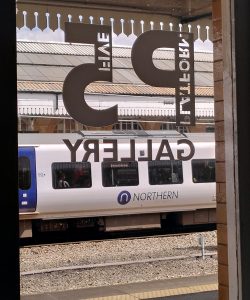 The sessions are Wednesday (29th) from 12.20 to 13.20 with a number of animations. After lunch at 14.00 it’s ‘Past and Present’ films up to 15.30. On the Thursday there is an ‘environment’ theme, between 11.30 and 13.00. The afternoon features more ‘Past and Present’ films.
The sessions are Wednesday (29th) from 12.20 to 13.20 with a number of animations. After lunch at 14.00 it’s ‘Past and Present’ films up to 15.30. On the Thursday there is an ‘environment’ theme, between 11.30 and 13.00. The afternoon features more ‘Past and Present’ films.
Pre-booking is essential. Seating is limited to 30 people per session and you will be encouraged to wear a mask if you are attending. If you would like to book a place or places, please contact Julie Levy at julielevy9@yahoo.co.uk by the 26th September 2021. Seats will be allocated on a first-come-first served basis so get your booking form in, fast! For the full festival programme see https://www.boltonfilmfestival.com/
- Meanwhile….An exhibition of work by artists from New Mills and Bolton celebrating the connections between their hometowns is on at the P5 Gallery and at New Mills Central station until this Saturday. Some great work! Supported by Platform Gallery, Bolton, High Peak and Hope Valley Community Rail Partnership & Bolton Station Community Partnership
A visit to Tom Hardy’s houses
Like so many organisations, REPTA (Railway Employees’ Transport Association but formerly known as ‘Railway Employees’ Privilege Ticket Association’ see www.repta.org.uk) has been ‘ticking over’ during lockdown, unable to hold meetings or promote trips both near and far. Finally, a reconvened, real live AGM was organised for last month, in Bournemouth. It was an opportunity to have a short break tagged on, exploring the Dorset coast and some of the attractive towns and villages nearby.
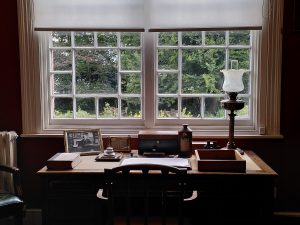
The bus network is pretty good and we were able to use our old folks’ passes to pop down to Christchurch and go further afield to Blandford Forum, Swanage and Dorchester. I’d been hoping to visit Thomas Hardy’s birthplace near Dorchester for some time, as well as his later home nearby. Combining train, bus and a bit of walking we got to Higher Bockhampton and saw the original cottage, now in National Trust ownership. From there we walked by a circuitous route to ‘Max Gate’, the much larger house which Hardy himself designed and lived in for many years before his death. There was yet another ‘Allen Clarke’ aspect to the visit. Clarke and his wife had called in to see Hardy during a cycling tour of Dorset. This is how he described it, writing in The Bolton Evening News as ‘Old Boltonian’ in 1935:
“Dorchester didn’t seem to have any great opinion of him. The landlady of the inn where we made enquiries as to the famous novelist’s residence remarked ‘Tom Hardy! Yes, he lives up at Max Gate.’…I said we had come all the way from Lancashire to see him. ‘Well, well,’ said the buxom dame. ‘It surprises me that people come here wanting to see Tom Hardy, there’s nothing special about him, I used to go to school with him.’
‘He has written great books,’ said I.
‘I don’t know,’ said the lady. ‘He doesn’t seem to have anything about him. Now, if you’d said it was his wife that wrote them –‘
We laughed and I bade good day to the genial landlady, who evidently wasn’t much interested in literature, nor impressed by authors.”
The Clarkes found ‘Tom’ to be at home and had a long discussion with him. Clarke commented on the novelist’s negative view of the Dorset dialect, with Hardy suggesting that William Barnes would have been a better poet had he written in standard English. Clarke disagreed. It would have been a fascinating debate to have witnessed!
Clarke, in an interview years later, said that he “expressed the view that dialect is the very soul of the people, and that Barnes would not have had such a hold on Dorset now, nor be such a favourite of all Dorset folk, had he written in ordinary English.” Clarke suggested that he should come up to Lancashire – “it would do him good mentally and physically.” Hardy replied that he had been to Bolton, on business with Tillotson’s, but remembered little about the town, or of Lancashire in general – to Clarke’s obvious disappointment. Clarke said that he corresponded with Hardy on a few occasions; they shared a common love of cycling and the countryside and there’s no doubt that Clarke’s novel writing style owed much to Hardy’s influence.
At Max Gate today there is reference to Hardy’s slightly fraught relationship with Tillotson’s. The firm set up a subsidiary which syndicated serialised novels and short stories. However, they rejected Tess of the D’Urbervilles on the grounds of indecency! They did publish The Woodlanders, for the princely fee of a thousand guineas.
Delightful Dorchester and Pallid Poundbury
We used the current hourly train service between Bournemouth and Dorchester for various outings. The last time I visited Dorchester the main station (Dorchester South) felt very isolated from the town and a bit depressing. 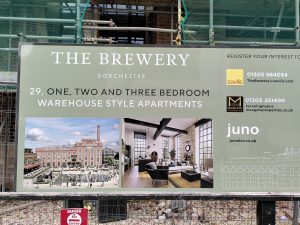 That has changed dramatically, with a new development in the former brewery effectively integrating the station much more with the town. The station forecourt has a steady flow of buses, including a half-hourly service to Poundbury, the ‘new town’ supported by Prince Charles. Having an interest in these sort of things, we hopped on the bus and had a wander round the place, which lies just on the edge of Dorchester. I last went there about ten years ago and found it a lifeless place. I have to say I still do.
That has changed dramatically, with a new development in the former brewery effectively integrating the station much more with the town. The station forecourt has a steady flow of buses, including a half-hourly service to Poundbury, the ‘new town’ supported by Prince Charles. Having an interest in these sort of things, we hopped on the bus and had a wander round the place, which lies just on the edge of Dorchester. I last went there about ten years ago and found it a lifeless place. I have to say I still do. 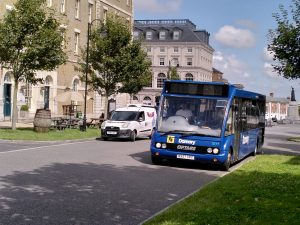 It’s all very nicely done but there is so much lacking: a sense of life and vibrancy. It’s ever so clean and tidy, some nice shops and the one pub. But I’d hate to live there. Give me Halliwell Road with its multi-ethnic corner shops, pubs, pie shops and chippies.
It’s all very nicely done but there is so much lacking: a sense of life and vibrancy. It’s ever so clean and tidy, some nice shops and the one pub. But I’d hate to live there. Give me Halliwell Road with its multi-ethnic corner shops, pubs, pie shops and chippies.
Swanage Railway impresses
No trip to Dorset would be complete without a ride on the Swanage Railway, and we had perfect summer weather to enjoy it. It’s a great operation 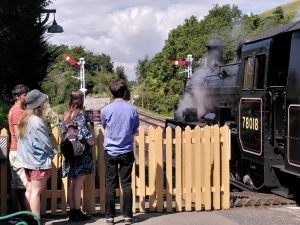 and we had a delightful afternoon in the goods yard at Corfe Castle supping coffee and watching the trains go by (then a very nice pint in one of the excellent village pubs). The small museum at Corfe is a model for how it should be done, with lots on the people who worked on the line. The nearby arists’ studios were an added bonus. We got there on the amazing no. 50 bus – an open-topper which uses the ferry to get across from Sandbanks. The bus was very busy with quite a few people unable to get on.
and we had a delightful afternoon in the goods yard at Corfe Castle supping coffee and watching the trains go by (then a very nice pint in one of the excellent village pubs). The small museum at Corfe is a model for how it should be done, with lots on the people who worked on the line. The nearby arists’ studios were an added bonus. We got there on the amazing no. 50 bus – an open-topper which uses the ferry to get across from Sandbanks. The bus was very busy with quite a few people unable to get on.
Station Mela brings out the sunshine
The well-established tradition of throwing a party on Bolton station was revived during the post-lockdown summer, and – true to form – the sun shone. It was our first attempt at holding a ‘mela’ – or festival – and all went pretty well. There were fifteen stalls and a very lively team of Indian drummers.
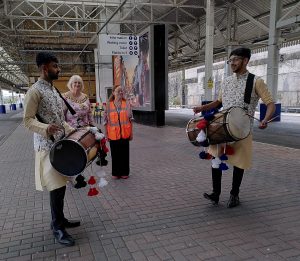
The event was a ‘fringe’ for the Bolton Food and Drink Festival which took place in the town centre. The mayor, Councillor Linda Thomas, popped down and took time to chat with stall holders and visitors. It was the last day of the ‘Railway Workers’ Art’ exhibition in the Platform 5 Gallery, which proved to be our most popular event so far (I think…)
Haigh Woodland Wanderer, Rivington Rover and Rammy Rambler
The dedicated weekend bus link from Wigan town centre to Haigh Woodland Park is doing very well, with passenger numbers steadily growing. It’s a joint initiative of South East Lancashire Community Rail Partnership, Wigan Council, Friends of Haigh Woodland Park and the Park itself. We had a trip on August Bank Holiday which seems to have been the busiest day so far, with over a 120 users of the hourly service.
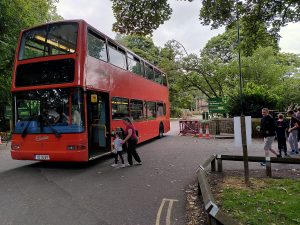
The operator is Finch’s of Wigan. The extension of the 575 Bolton – Horwich service to serve Rivington – and other CRP initiative – was picking up well until a road closure meant that the service couldn’t operate during most of August – exactly when it should have been at its busiest. The service has re-started and we’re making a big effort to promote the half-hourly service, which is running every Sunday for the next month. The operator is Diamond Buses, who are also running an open-top double-decker from Bolton to Ramsbottom connecting with the East Lancashire Railway. Details on https://www.diamondbuses.com/north-west/
(Sub) Station Garden Adoption Takes off in Halliwell
The space next to Harpers Lane – ‘el substa’ as it is described on maps – (electricity sub-station to most of us) was derelict for years, with overgrown bushes, rubbish dumped and little to incline you to linger. That has all changed thanks to the efforts of a new community group –

Harpers Lane Community Garden has seen a remarkable transformation in just a few months. Much of the old vegetation and all of the rubbish has been cleared. The area has been landscaped and a bench provided by a local craftsman, Geoff. New paths have been created and a range of plants donated by local people adorn the space. A garden party last Sunday raised £340 for further development of the site.
Allen Clarke is out……Publications update from Lancashire Loominary
Allen Clarke (‘Teddy Ashton’) Lancashire’s Romantic Radical is out! The first edition was published in 2009 and the new one substantially improves on the original, despite some typos managing to creep in. There’s some additional information about his life and work and an entirely new chapter on his railway writings (‘Teddy Ashton Takes the Train’).
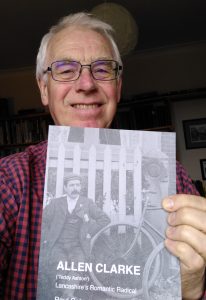 The ‘official’ book launch is on Saturday September 25th at Bolton Library’s Lecture Theatre, at 11.00. I’ll say a few words about the book and maybe do a few readings. Copies will be available at a discounted price.
The ‘official’ book launch is on Saturday September 25th at Bolton Library’s Lecture Theatre, at 11.00. I’ll say a few words about the book and maybe do a few readings. Copies will be available at a discounted price.
There will be a more informal event at Bunbury’s Real Ale Bar, 397 Chorley Old Road, on October 19th, from 19.00h. Hopefully there will be a ‘Blackpool Launch’ later in October.
I’m doing a special offer on the Allen Clarke book – it will sell at £18.99 in the shops and on Amazon (plus postage) but I’ll do it for £15 with free local delivery c/o Bolton Bicycling Bookshop, or £3 postage in the UK. See www.lancashireloominary.co.uk for details of how to buy it.
My photo gallery – a slight emphasis on steam
I’ve been making some changes to my website/s…I’m keeping www.lancashireloominary.co.uk for all publications, including The Salvo. However, www.paulsalveson.org.uk has been re-born as Paul Salveson Photography: places, trains and factories.
There are several pages dealing with different aspects of my photography: BR Steam, Continental Steam, The Modern Railway, Industrial Steam, Northern Rural Landscapes, Mills and Mines, and Strikes, Riots and Demonstrations. This is my current favourite: Industrial Landscapes of Lancashire – Paul Salveson Photography
Good places to buy my books and other things
As lockdown eases, more shops are opening which sell my books. These include Carnforth Bookshop, Wrights’ Reads in Horwich, Pendle Heritage Centre in Barrowford and Kelsall’s in Littleborough. Please support your local bookshops, it’s vital they survive. A great feature of any walk up Rivington Pike is the Pike Snack Shack on
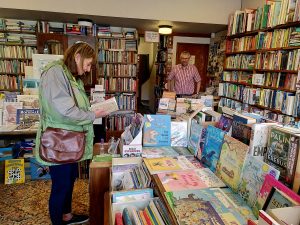
George’s Lane – a long way up, the last place before you get on the track to the summit. They do coffee, pies, sandwiches and cakes for takeaway and you can sit amidst the heather and savour the view across the West Lancashire Plain. You can also buy copies of Moorlands, Memories and Reflections. Another popular addition to my list of retail outlets is Bunbury’s real ale shop at 397 Chorley Old Road, Bolton. A slightly unconventional outlet is A Small Good Thing, on Church Road. This is a great little shop mainly selling organic fruit and veg and a range of ‘small good things’. Fletcher’s Newsagents on Markland Hill Bolton are stockists. Justicia Fair Trade Shop on Knowsley Street, Bolton, is handy for the town centre and has a full set of my books available (and some great gifts from around the world, ethically sourced).
If you’re local, or passing through, you can call in at 109 Harpers Lane and buy in person – just ring first or email to make sure I’m around (07795 008691).
Small Salvoes
- Bolton’s P5 Gallery is currently showing an excellent exhibition, with local artists and friends from New Mills (Derbyshire). Also on at New Mills Central Station. Some great work on display, the exhibition is open Thursday, Friday and Saturday 12.00 to 16.00 with free admission. Last chance to see it this Saturday!
- The ‘Clarion Sunday’ event last Sunday at the Nelson ILP Club House near Roughlee attracted over 200 cyclists and raised a tidy sum for Clarion funds. It was the first major gathering following the move (with questionable authority) to delete reference to ‘socialism’ from the club’s constitution.
- The Working Class Movement Library, a short but potentially lethal walk from Salford Crescent (pedestrian lights out of commission), has re-started its regular programme of free lectures. For details see www.wcml.org.uk
- Plans are underway for a ‘live’ conference by the Hannah Mitchell Foundation, the cross-party campaign for Northern devolution and democracy. The subject will be prospects for Northern devolution; the day will also include the Foundation’s AGM. Provisional date is Saturday December 4th, Friends Meeting House, Manchester. Details will be posted on HMF’s recently-updated website: www.hannah-mitchell.org.uk
Crank Quiz: New Towns
There was a good response to the last Crank Quiz (see website for entries). This one is partly inspired by Poundbury, which doesn’t have a rail service. What new towns had a rail connection from the beginning…and which new towns lost their rail connection (but might be getting it back).
……………………………………………………………………………………………………………..
Special Traffic Notices: Coming Events
Saturday September 25th: Launch of my new book on Allen Clarke at Bolton Library’s Lecture Theatre, 11.00. Get there early and have a cup of tea or an orange juice!
Wednesday September 29th, 18.00: Richard Lysons is speaking on the history of The Free Trade Hall, at Manchester Central Library. Book via eventbrite (it’s free) and search for ‘Free Trade Hall’
Wednesday September 29th – Sunday October 3rd: Bolton Film Festival. See www.boltonfilmfestival.com
Wednesday October 13th: Walk o’er Winter Hill: Mass Trespass! 19.30 Ainsworth Arms Bolton
Tuesday October 19th: Allen Clarke’s Bolton: Bunbury’s real Ale Bar, 397 Chorley Old Road, Bolton at 19.00
Saturday December 4th: Hannah Mitchell Foundation Conference and AGM, Manchester. See www.hannah-mitchell.org.uk
Saturday December 11th: Salvo speaking at Railway and Canal Historical Society, Friends Meeting House Manchester at 14.00. Subject: Lancashire’s Railways: a cultural perspective
……………………………………………………………………………………………………
The Salvo Publications List – see www.lancashireloominary.co.uk
The following are all available from The Salvo Publishing HQ, here at 109 Harpers Lane, Bolton BL1 6HU. Cheques should be made out to ‘Paul Salveson’ though you can send cash if you like but don’t expect any change. Bottles of whisky, old bound volumes of Railway Magazine, number-plates etc. by negotiation. If you are local you are welcome to call round and pick books up at the door, or the Bolton Bicycling Bookshop can deliver to yours.
Allen Clarke/Teddy Ashton – Lancashire’s Romantic Radical (NEW!). The story of Lancashire’s errant genius – cyclist, philosopher, unsuccessful politician, amazingly popular dialect writer. This book outlines the life and writings of one of Lancashire’s most prolific – and interesting – writers. Allen Clarke (1863-1935) was the son of mill workers and began work in the mill himself at the age of 11. Special offer of £15 plus free local delivery or £3 postage to Salvo readers
Moorlands, Memories and Reflections (2020) A hundred years ago Lancashire writer Allen Clarke published a forgotten masterpiece – Moorlands and Memories, sub-titled ‘rambles and rides in the fair places of Steam-Engine Land’. Clarke’s biographer, Professor Paul Salveson, has published a new book celebrating Clarke’s original and bringing the story of Lancashire’s moorland heritage up to date. Maxine Peake, in her foreword to Paul’s book, says “Hill walking, cycling, literature, philosophy, protest and The North…. these are a few of my favourite things.” She adds “Paul Salveson’s new book on Allen Clarke is irresistible.” Price £20 – see the website for details of how to buy: http://lancashireloominary.co.uk/index.html/order-form
The Works (2020). My first novel , set in Horwich and Bolton in the 1970s and 1980s but bringing the story up to the present and beyond. Much of the action takes place in Horwich Loco Works and the campaign to save it from closure. In real life, it closed down in 1983. In the novel, after a workers’ occupation it is run as a co-operative, building both steam for heritage railways and modern eco-friendly trains for the world market. Price £6 (special offer). Also on Kindle £4.99.
Will Yo’ Come O’ Sunday Mornin’? The Winter Hill Trespass of 1896 (1996). Quite a few copies have re-surfaced and are available price £5 – with all proceeds going to Bolton Socialist Club, which played the main part in organising the original demonstrations in 1896. This was Britain’s biggest-ever rights of way battle with a series of demonstrations which peaked at 12,000 one Sunday afternoon in September 1896. SOLD OUT
With Walt Whitman in Bolton – Lancashire’s Links to Walt Whitman This charts the remarkable story of Bolton’s long-lasting links to America’s great poet. Bolton’s links with the great American poet Walt Whitman make up one of the most fascinating footnotes in literary history. From the 1880s a small group of Boltonians began a correspondence with Whitman and two (John Johnston and J W Wallace) visited the poet in America. Special offer April £5 plus postage if you’re not local. New and extended edition under preparation – should be out late July
The Settle-Carlisle Railway (2019) published by Crowood and available in most bookshops price £24. It’s a general history of the railway, bringing it up to date. It includes a chapter on the author’s time as a goods guard on the line, when he was based at Blackburn in the 1970s. The book includes a guide to the line, from Leeds to Carlisle. Some previously-unused sources helped to give the book a stronger ‘social’ dimension, including the columns of the LMS staff magazine in the 1920s. ISBN 978-1-78500-637-1
You can get a better idea from going to my website: http://www.lancashireloominary.co.uk
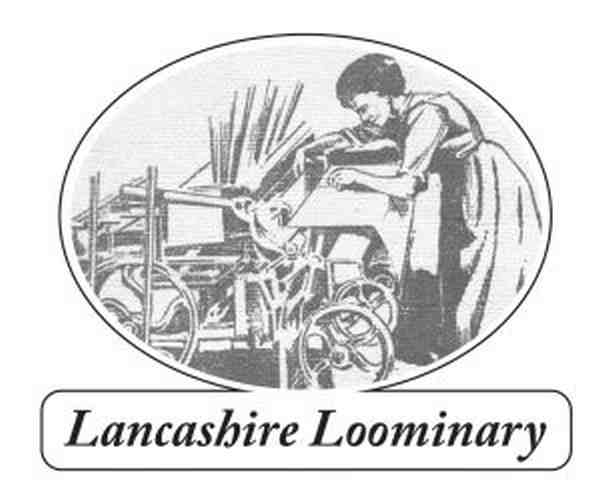
4 replies on “Northern Weekly Salvo 296”
Well, of the English New Towns, of the first wave, Harlow didn’t have one at its opening, but has one now. Peterlee did have Easington at the beginning, lost it and now has it back, Newton Aycliffe had a halt, lost it but got a station back, and Basildon for a long time had to make do with distant Pitsea until a station was built in the 80’s (I think). Of the second wave, Skelmersdale didn’t have one, but is continually promised one (which never seems to transpire) Washington had one which closed before the NT was developed, still hasn’t and like Skem, keeps getting promises which lead to nowhere. Dawley . I assume, has to make do with Telford. In Wales Cwmbran didn’t have one until the 1990’s. In Scotland, I think all the formal New Towns have stations. Obviously there are places like Poundbury which were never official ‘New Towns” under the act, as with other sites like Haverhill in Suffolk which has no railway link yet.
As ever, lots of good stuff. At Avenel (which I have found was built by the Standing Counsel for the L and NWR in 1867 (the Catholic convert James Robert Hope-Scott, friend of (Saint) John Henry Newman) who inherited the Abbotsford estate via Scott’s dour biographer John Gibson Lockhart, whose daughter he married. The original ‘bastle house’ (a subordinate Scots castle, this time for ex-monks) figures in Scott’s rather good but neglected novel ‘The Abbot’ but was was allowed to decay and be demolished in the late 18th century. ‘Irn Road’ my 250pp A5 survey of the life, struggle and remarkable renaissance of world railways should be published in the New Year.
Crawley had a railway station before becoming a New Town, although it was relocated some time (in the sixties as I recall) and it also has Three Bridges and Ifield within its boundaries. As Crawley and Horsham have extended towards each other, Crawley might now even lay claim to Faygate as well, although it is administratively tied to Horsham
Cwmbran New Town had a station when it was conceived ‘Lower Pontnewydd’ which was on the Newport-Blaenavon line, shut in 1962 pre-Beeching.
The current Cwmbran station was opened in 1985 following an approach by myself and the (late) Frank Markham, the Divisional Manager, Cardiff, in the last days of the New Town Corporation, persuading them that the best legacy they could leave was a railway station: and it worked! John Davies